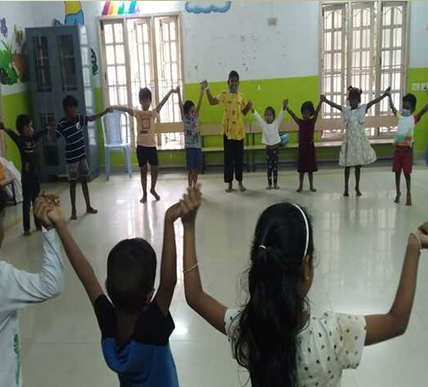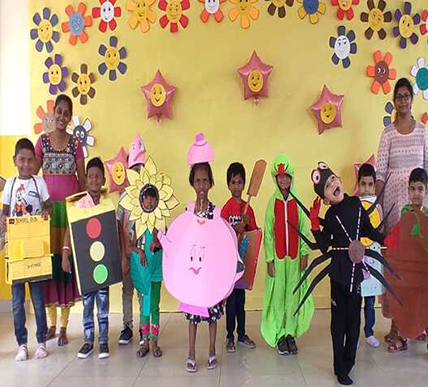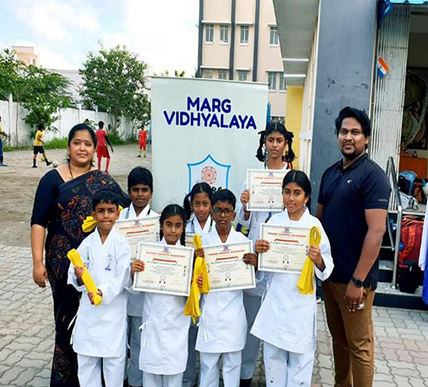WELCOME TO MARG VIDHYALAYA SECONDARY SCHOOL CBSE
The Institution Of Marg Vidhyalaya Was The Brain Child Of Mrs K.Rajeshwari,Who Felt The Need To Provide Holistic Education.
Marg Vidhyalaya Was Estabilished In The Year 2010, Has Been Affiliated To The Central Board Of Secondary Education, New Delhi Since 2019.It Is Managed By Rajeshwari Educational Trust Formed And Registered In The Year 2012 Under The Trust Act,1882 . The Core Objective Of This Trust Is To Manage, Improve And Develop Marg Vidhyalaya , Status of the school Senior secondary Affiliated upto 31/03/2024. The School Provides Its Students With Vibrant Education Programme And Strives To Provide An Academically Challenging Environment In Order To Foster Intellectual Curiosity And Sense Of Responsibility In Our Students. The School Has The Best Learning Environment With Excellent Physical Infrastructure And Top Human Capital. Our Dedicated Teachers Inspire Our Students To Achieve The Highest Possible Academic Standards While Focusing On Their All Round Development.
Our New Campus
Our New Campus At Pallikaranai , Was Inaugurated By Our Chairman On 23 Th December 2018 The New Campus Continues To Focus On Our Core Principle Of All Round Devolopment In A Vibrant And Simulating Environment
Dhruva Sports Academy Helps The Child To Enhance Their Physical And Cognitive Capability And Is Well Equipped To Develop The Child’s Ability In Any Sport Of Interest.
The Library Is Well Stocked With Books Covering All Areas Of Knowledge Which Will Be Of Interest To All Children From Kindergarten To Secondary Level.
The New Infrastructure Emphasises On Making The Learning: Motivating, Engaging And Fun Process For Students.
As We Complete Two Years Now, Marg Vidhyalaya, Pallikaranai Branch Has Grown From A Humble Beginning Of 250 Students To 650 Students With The Enormous Trust And Faith Of Parents. Parents Have Been A Pillar Of Support In All School Endeavours
We Work Along With The Parents To Develop And Sharpen The Skills And Knowledge, And Bring Out The Best In Every Child.
Our Team
K.GEETHA
MARG VIDHYALAYA FOUNDER - PRESIDENT
L.KRISHNAN
GANESH TRAVELS CHAIRMAN
DR.K.GANAPATHY SUBRAMANIAM
M.G.M HEALTH CARE - Trustee
K.SHANKER
M.D. GANESH TRAVELS - BLR Trustee

Why People Choose Our Education

For most kids, school is the first setting where they learn to socialize with others outside their family. They learn to make friends, listen to teachers, and work through problems. Learning these social skills early on gives kids an important foundation for their interactions in society. Studies show education can increase what’s called “learned effectiveness,” which includes traits like self-control and cognitive ability. Students also learn “soft skills” like good communication, teamwork, and flexibility. Going to school doesn’t automatically teach social skills; it’s still the responsibility of teachers and other adults to encourage healthy socialization. When they spot unhealthy socialization – like bullying – they should intervene appropriately.

Being self-assured and confident in one’s abilities is crucial to healthy self-esteem. People who don’t have much confidence are more likely to be taken advantage of and struggle with anxiety. In a school setting, kids get the opportunity to build their confidence early on. As they learn to read, write, solve math problems, and more, their confidence in their abilities increases. A teacher plays a very important role in this. It’s their job to celebrate a student’s progress as well as their hard work, as many struggle with certain subjects.

Critical thinking is an essential part of any subject in school. Whether they’re studying literature, science, or history, students can develop critical thinking techniques. They use these to absorb the material, form their own ideas, and express themselves in writing and speaking. These skills translate to every area of life, whether it’s in academia, the work setting, or relationships. How do schools teach critical thinking? It needs to be intentional or schools run the risk of just teaching kids how to memorize facts. Teachers can improve their students’ critical thinking skills by asking open-ended questions, encouraging students to think for themselves, presenting real-life problems, and encouraging interaction between students.

Schools are more than just classrooms. Many also offer sports, clubs, and other extracurricular activities. Some of these can lead to scholarships, which give students access to higher education. Even if a student doesn’t thrive in a classroom setting, they can find something else at their school that benefits them. Do extracurriculars help with academic achievement? It depends. One study found that it depends on factors like parental educational level, age, and sex. In early adolescence, girls who participated in extracurriculars saw improved academic achievements, but in later adolescence, it was better if they didn’t participate in as many extracurriculars. This could be because schoolwork becomes more challenging and time-consuming. Some students will need fewer distractions to do well, but others will be fine with extracurriculars. It depends on the specific student.









